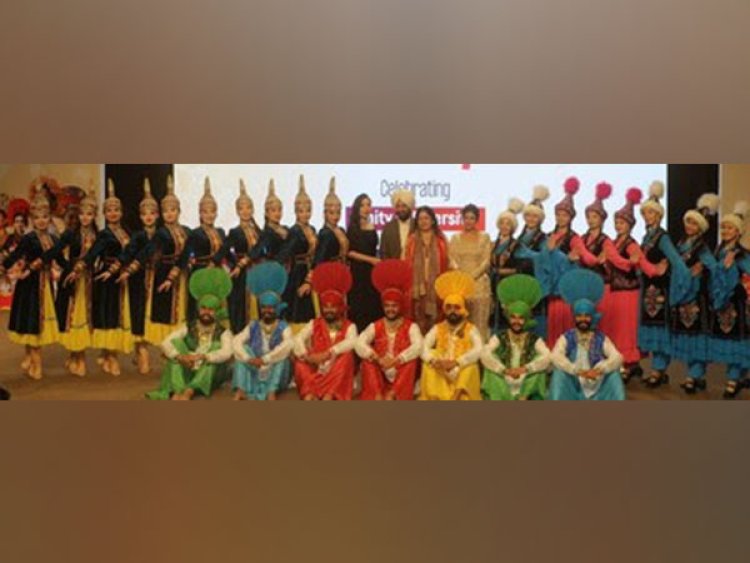Chandigarh University hosts International Music & Dance festival; dedicates it to PM Modi's vision to connect youth with cultural heritage

Chandigarh, India: An unforgettable cultural extravaganza was witnessed at Chandigarh, as the cultural troupes of around 40 countries participated in the international cultural exchange event held at the varsity - featuring talent and creativity from around the globe.
Meenakshi Lekhi, Union Minister of State (MoS) for external affairs and culture, who was the chief guest on the occasion, said that Indian culture is the culture of science. "Although, Science has become a significant part of our lives today, it is important to know that Science is not separate from our culture. Today, more than 65 per cent of all the medicines are phytochemicals, which are derived from plants just as Ayurveda does," she said.
In the cultural event at CU - named International Dance and Music Festival on the theme 'One World, Many Cultures' - the students of around 40 countries attended and participated. On Sunday, the cultural troupes of Malaysia, Iraq, Kyrgyz Republic, Nepal, Bhutan, Kazakhstan, Lesotho, Romania and Bangladesh dressed in their colourful traditional attires showcased the beauty of indigenous music and dance cultures of their respective countries. The event was held in collaboration with the Indian Council for Cultural Relations (ICCR), Ministry of External Affairs, Government of India.
Amit Sahai Mathur, program director, Indian Council for Cultural Relations (ICCR) attended the event as guest of honour. CU Chancellor Satnam Singh Sandhu; Prof Himani Sood, vice president, Chandigarh University were present on the occasion along with other dignitaries and varsity officials.
This event aimed to promote international culture and celebrate diversity and inclusivity. It was held to build a more compassionate and harmonious society by bringing the people of the world together in celebration. All the cultural troupes also took part in the procession on the CU campus - celebrating the diverse cultures and unity of diversity.
While addressing the participants and students during the event, Union Minister of State (MoS) for external affairs and culture, Meenakshi Lekhi said that India shares deep-rooted cultural and historical relations with Commonwealth of Independent States (CIS) countries such as Kazakhstan and Kyrgyzstan, dating back to the ancient silk route era.
"In the cultural sphere, we have so many similarities in practices, music, language including Sanskrit. However, post-independence in 1947, these countries grew distant from India due to the superficiality of borders but the cultural connect has remained. Because, the superficiality of differences does not take away the unity, which is something that Indians seek in everything. Unity is not about similarities and differences between the nations and cultures, but it is an attitude of looking at the things," she said.
While highlighting that Indian culture is the culture of science, she further said, "All the sciences and art practiced across the world today, is a part of Indian cultural heritage which is a part of the world history that is thousands of years old. Given its number of health benefits, we can see that Yoga has now become a global practice," she said, adding that Indians are the products of Sindhu Saraswati civilization which itself exemplifies the culture of continuity and unity.
She added, "With the more exposure one gets at this age and the more cultures he or she gets to see and learn from, comes the realization about being a part of the culture and culture being a part of oneself. It is the best way to celebrate 'Vasudhaiv Kutumbhkam' - the world is one big family - because if we focus on the similarities, then we will find that there is unity in diversity."
Meanwhile, CU Chancellor, Satnam Singh Sandhu, said that the event was held to bring the world together as one global family. "The mega event reflected both the world's unity and incredible diversity. It is also important that we promote dignity for world culture and make our youth part of this culture so that we all collectively can foster cultural ties and create a better world. Such events sow the seeds of peace and compassion among the youth," he said.
Sandhu also said, "India is moving ahead with the mantra of 'Virasat Bhi, Vikas Bhi' given by Prime Minister Narendra Modi, which means that heritage is a vital asset for economic growth, diversification, and progress of the country. Cultural heritage defines the history and identity of a nation and PM Modi has remained committed to preserve and protect the rich heritage of the country. Modi government has taken several initiatives during the last 9 years. The Modi government launched the schemes like PRASAD and HRIDAY which shows in its unwavering commitment to safeguarding India's ancient civilizational heritage."
"The number of India's UNESCO World Heritage Sites has risen to 42, which includes 34 in cultural category. Presently, India has the sixth largest number of UNESCO World Heritage Sites in the World. It is pertinent to highlight here that India has added 12 new World Heritage Sites since 2014, which exemplifies PM Modi's firm dedication towards Indian culture and its heritage," he said.
Performances by international cultural troupes during international festival
The cultural troupe from Kazakhstan gave dance and music performances. The 'Akkerbez National Dance Ensemble' from Zhambyl Region of Kazakhstan performed on the occasion with several dance performances like Kara Zhogra, Gakku, Shattyk and Akku.
Sailau Araylim Abayovna from Kazakhstan shared, "Today's international dance and music festival gave us the opportunity to reflect centuries-old cultural history of our country and introduce it to people from different countries of the world. It was a privilege to perform in India and learn about diverse cultures across the world." She also shared that a 12-member troupe from Kazakhstan performed Akkerbez, a traditional dance of the Zhambyl region named after K. Azirbayev. This was followed by folk dance and music performances by young artists from the country.
The 'Sharya Folk Art' troupe from Kurdistan Region of Iraq presented Kurdish folk dance during the festival. Similarly, the visiting troupe from Kyrgyz Republic, the 'Ak-Niet' dance ensemble presented Kyrgyz folk dances. They presented dance forms like Symbat (Kyrgyz national dance), Snowflake (classical dance), Ai-Selki (national kyrgyz dance), Tenderness (classical dance) and Kyrgyz dance.
While speaking on the occasion, Omorova Zhamila MS from Kyrgyz Republic expressed gratitude to have been a part of today's celebration of world unity and diversity. She further shared that Kyrgyz troupe performed Symbat (national folk dance), Snowflake and Tenderness (classical dance), Ai-Selki (national Kyrgyz dance), and Kyrgyz dance, through which the artists showcased the beautiful culture of central Asian country. "In addition, today's event gave us the opportunity to connect with diverse cultures of the world and learn more about them."
The troupe from Bhutan performed the 'Joenpa Legso'. The welcome dance, Joenpa Legso is known to bless the audience and the entire ceremony with luck and charm. It sets the mood right for the rest of the ceremony to take place. Men and women carry traditional attire while performing this dance in Bhutan. Men wear 'gho' and their shoes are called 'tsholham'. Women wear 'kira', 'tego' and 'wonju'.
The team from Nepal performed Dishka Dance (performed at weddings) and Jhijhiya Dance (folk dance) which popular in the western and central Terai among Maithili community.
The team from Lesotho performed Mokhibo dance whereby women dance knelt down emphasizing shoulders and hips in celebration of femininity. It is performed by women during celebrations.
From Malaysia, the Sugam Karnatica group, founded by Sisters Sujitra, Sumitra and Subatra Jayaseelan specialises in combining pop elements into their predominant Carnatic music background, resulting in a fresh genre of music.
Subatra Jayaseelan, a member of Sugam Karnatica from Malaysia, said that such cultural events are a wonderful opportunity to contribute to the preservation and promotion of the cultural individuality of the country formed over the years. During the event, Sugam Karnatica presented a traditional Malaysian music performance combining pop elements into their predominant Carnatic music background, resulting in a fresh genre of music.
From Romania, 'SUFLET - Soundscapes from the Carpathians and the Himalayas' also performed. Through the confluence of traditional wind instruments panflute and bansuri, with the accompaniment of Tabla and modern instruments, the artists presented reinterpretations of Romanian folklore masterpieces alongside a colourful repertoire inspired by Indian seasons and festivals.
Narcisa Baleanu, a Romanian who is a part of SUFLET (Soundscapes from the Carpathians and the Himalayas) with traditional wind instruments such as bansuri and panflute, which is inspired by the Indian seasons and festivals. She said, "India and Romani have rich cultural heritage, and today's festival is a celebration of the friendship between the two countries. The event also gave different countries a platform to come together and share their fascinating culture across the world."
A cultural troupe from Bangladesh presented their folk dances. During the international cultural event Bhangra was also performed by the local troupe members. it is a fusion of music and dance which originates from the Punjab region of India.
Sharanjit Singh, part of the Bhangra troupe performed by the CU students as they represented India during the international dance and music festival, expressed pride and privilege to host this global-level event and showcase the cultural heritage of the country. He said, "Such cultural festivals must be organized often as they enable the youth to understand and connect with the world."















































